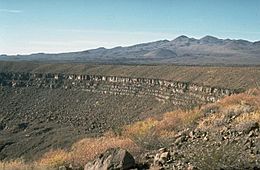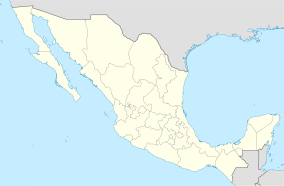Alto Golfo de California Biosphere Reserve facts for kids
Quick facts for kids Alto Golfo de California Biosphere Reserve |
|
|---|---|

Pinacate volcanic field
|
|
| Location | Gulf of California, Mexico |
| Nearest town | San Luis Río Colorado, Sonora
Puerto Peñasco, Sonora Mexicali, Baja California |
| Area | 1,652,110 hectares (6,378.8 sq mi) |
| Established | 1995 |
The Alto Golfo de California Biosphere Reserve is a special protected area in northwestern Mexico. It's recognized by UNESCO as a Biosphere Reserve.
This huge reserve covers about 1.6 million hectares (or 6,379 square miles)! It includes the amazing El Pinacate y Gran Desierto area and the Bahia Adair along the Gulf of California. You'll find incredible landscapes here, like volcanic areas with huge craters, sandy dunes, green oases, and beautiful beaches. It's home to many different plants and animals.
The reserve was first created in 1993 by the President of Mexico. Its official name is Reserva de la Biosfera del Alto Golfo de California y Delta del Río Colorado. Its size was made even bigger in 1995.
Many people live in and around the reserve. They work in farming, fishing, and other local jobs. Some also work in factories in nearby cities like San Luis Río Colorado.
The reserve is managed by different local governments. These include the Municipality of Mexicali in Baja California and the Municipalities of Puerto Peñasco and San Luis Río Colorado in Sonora.
Contents
Amazing Environments
This reserve has several unique environments. Each one is special and helps different plants and animals live there.
El Pinacate y Gran Desierto de Altar
The El Pinacate y Gran Desierto de Altar Biosphere Reserve is a UNESCO World Heritage Site. It's part of the larger Alto Golfo reserve. This area is in the Sonoran Desert, close to the border with Arizona, United States. It's also north of the city of Puerto Peñasco.
A big part of this landscape is a volcanic system called Santa Clara. It has three main peaks: Pinacate, Carnegie, and Medio. The highest peak is Cerro del Pinacate (Santa Clara volcano), which is about 1,190 meters (3,904 feet) tall. The name "Pinacate" comes from a Náhuatl language word for the Pinacate beetle. This beetle is a type of stink beetle that lives only in the Sonoran Desert.
Bahia Adair
Bahia Adair, also known as Adair Bay, is located at the northern end of the Gulf of California. This area has three different types of habitats:
- Wetlands: Areas where the land is covered by water, like marshes.
- Artesian wells: Places where water flows naturally out of the ground.
- Salt pans: Flat areas covered with salt.
Many endangered animals live here, including a special fish called the desert pupfish. This fish is found only in this area.
Wildlife and Plants
The Alto Golfo de California Biosphere Reserve is home to a wide variety of plants and animals. You can find marine (ocean) species, coastal species, and land species.
The coastal areas have flat lands, beaches, and sand dunes. There are also granite mountains and areas shaped by volcanoes. The land animals in the reserve are very diverse. This is because there are so many different types of plants and landscapes, from wet areas to dry, sandy deserts. The Colorado River is an important home for the hogfish (Lachnolaimus maximus).
This reserve is one of the few places in North America where you can find the fringe-toed lizard (Uma inornata). It's also the westernmost place where the Gila monster (Heloderma suspectum) lives. Other reptiles you might see include:
- The diamondback rattlesnake
- The coral snake
- The chameleon
- The desert tortoise
The reserve is also a great place for birds. There are at least 80 different kinds of land and water birds. Some live here all year, while others migrate through the area. This makes the reserve a very diverse place for birds.
Many mammals live on the land, including:
- White-tailed deer
- Mule deer (Odocoileus hemionus)
- Big Horn Sheep (Ovis canadensis cremnobates)
- Pronghorn (Antilocapra americana)
- The javelina (a wild pig-like animal)
- The long-nosed bat
The plants in the reserve are also very interesting. Some examples include:
- The tall saguaro cactus
- The strawberry hedgehog cactus (Echinocereus engelmannii)
- The thorny bisnaga cactus
- The Mexican palo verde tree (Parkinsonia aculeata)
- The ironwood tree
In the ocean, some important marine species live here. These include:
- The porpoise or vaquita (Phocoena sinus). This small porpoise is protected by Mexican law because it is an endangered species.
- The totoaba (a large fish)
- The Yuma clapper rail (a type of bird that lives near water)
See also
 In Spanish: Reserva de la biosfera Alto Golfo de California y Delta del Río Colorado para niños
In Spanish: Reserva de la biosfera Alto Golfo de California y Delta del Río Colorado para niños
 | Bessie Coleman |
 | Spann Watson |
 | Jill E. Brown |
 | Sherman W. White |


